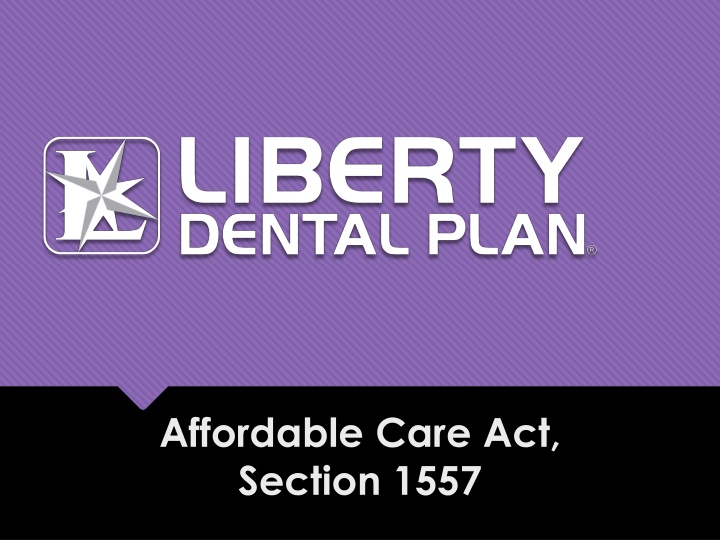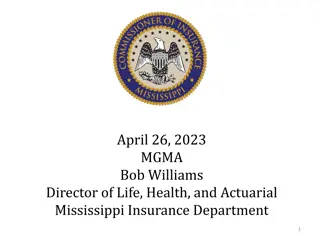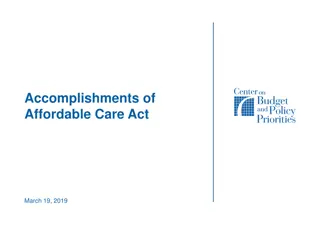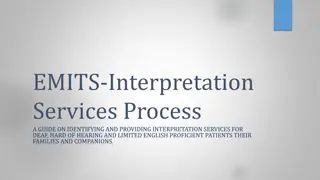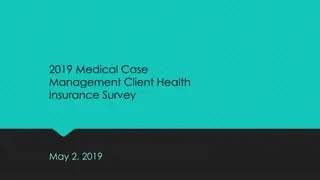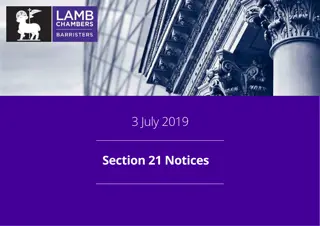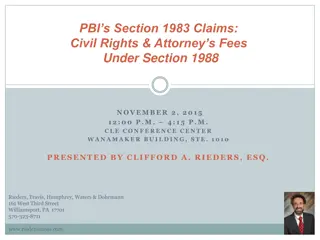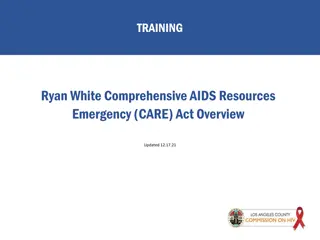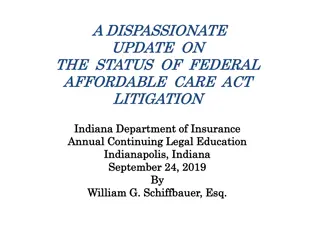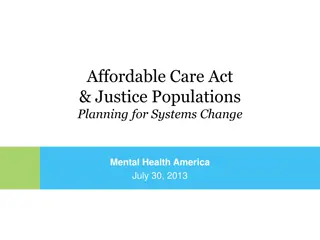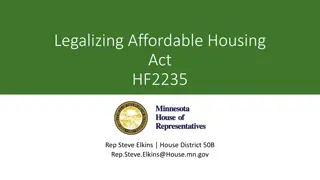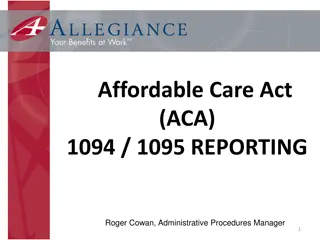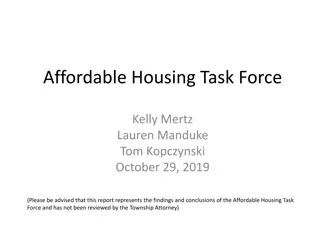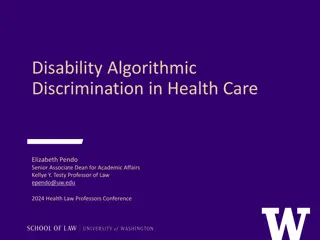Section 1557 of Affordable Care Act
Section 1557 of the Affordable Care Act prohibits discrimination based on various factors in health programs receiving Federal financial assistance. Covered entities must comply with the Final Rule, ensuring equitable access to healthcare. The Final Rule implements civil rights laws and establishes standards to prevent discrimination in federally funded health programs, including Health Insurance Marketplaces.
Download Presentation

Please find below an Image/Link to download the presentation.
The content on the website is provided AS IS for your information and personal use only. It may not be sold, licensed, or shared on other websites without obtaining consent from the author.If you encounter any issues during the download, it is possible that the publisher has removed the file from their server.
You are allowed to download the files provided on this website for personal or commercial use, subject to the condition that they are used lawfully. All files are the property of their respective owners.
The content on the website is provided AS IS for your information and personal use only. It may not be sold, licensed, or shared on other websites without obtaining consent from the author.
E N D
Presentation Transcript
Affordable Care Act, Section 1557
Understand the civil rights provision of the Affordable Care Act of 2010 (Section 1557) Be able to identify the key Provisions of the Final Rule After this training you will Be able to name the LIBERTY s Civil Rights Coordinator Know where to locate the enrollee notifications for Section 1557 Understand the grievance process for suspected discrimination
What is Section 1557 Section 1557 is the nondiscrimination provision of the Affordable Care Act (ACA). The law prohibits discrimination on the basis of race, color, national origin, sex, age, or disability in health programs or activities that receive Federal financial assistance or are administered by an Executive agency or any entity established under Title I of the ACA.. The Final Rule was implemented in May of 2016, requiring covered entities to comply with the rule s requirements: posting notices of consumer rights and taglines; accessibility standards for buildings not previously covered by the Americans with Disabilities Act; and design changes to health coverage. Section 1557 has been in effect since the enactment of the ACA in 2010. Since that time, the Office for Civil Rights (OCR) has been receiving and investigating discrimination complaints under Section 1557.
Any health program or activity any part of which received funding from HHS Section 1557 extends nondiscrimination protections to individuals participating in: Any health program or activity that HHS itself administers Health Insurance Marketplaces and all plans offered by issuers that participate in those Marketplaces.
Final Rule on Section 1557 OCR issued the final rule to educate consumers about their rights and to help covered entities understand their legal obligations under Section 1557. The final rule builds on the standards of the four Federal civil rights laws referenced in Section 1557 and their implementing regulations: Title VI of the Civil Rights Act of 1964 Title IX of the Education Amendments of 1972 Section 504 of the Rehabilitation Act of 1973 The Age Discrimination Act of 1975 Among other things, the final rule implements prohibitions against sex discrimination in federally funded health care programs and establishes standards that apply to the Health Insurance Marketplaces and health programs administered by HHS.
Section 1557 Prohibits Under the final rule, LIBERTY cannot: deny, cancel, limit, or refuse to issue or renew a health related insurance policy or other health-related coverage; deny or limit coverage of a claim, or impose additional cost sharing or other limitations or restrictions; or employ marketing practices or benefit designs that discriminate on the basis of race, color, national origin, sex, age, or disability. The final rule does not require plans to cover any particular benefit or service or prohibit issuers from determining whether a particular health service is medically necessary, but LIBERTY cannot have a coverage policy that operates in a discriminatory manner. The final rule prohibits LIBERTY from discriminating on the basis of race, color, national origin, sex, age or disability when providing or administering health-related insurance or other health-related coverage. This prohibition applies to all health insurance issuers that are recipients of Federal financial assistance, which includes premium tax credits and cost sharing reductions associated with coverage offered through the Health Insurance Marketplaces or Medicare Parts A, C and D payments.
Key Provisions of Section 1557 Protecting Individuals against Discrimination Ensuring Meaningful Access for Individuals with Limited English Proficiency (LEP) Ensuring Effective Communications w/ and Accessibility for Individuals with Disabilities
Protecting Individuals Against Sex Discrimination Section 1557 builds on prior Federal civil rights laws to prohibit sex discrimination in health care. The final rule requires that women be treated equally with men in the health care they receive and also prohibits the denial of health care or health coverage based on an individual s sex, including discrimination based on pregnancy. Protections against Sex Discrimination Individuals cannot be denied health care or health coverage based on their sex. Women must be treated equally with men in the health care they receive and the insurance they obtain. Sex-specific health programs or activities are permissible only if the entity can demonstrate an exceedingly persuasive justification. For example, that the sex-specific health program or activity is substantially related to the achievement of an important health-related or scientific objective.
Individuals with limited English proficiency (LEP) The final rule makes clear that the prohibition on national origin discrimination requires LIBERTY to take reasonable steps to provide meaningful access to each individual with limited English proficiency who is eligible to be served or likely to be encountered within LIBERTYs health programs and activities. An individual with limited English proficiency is a person whose primary language for communication is not English and who has a limited ability to read, write, speak, or understand English. Protections for Individuals with Limited English Proficiency Reasonable steps include LIBERTY s language assistance services, such as oral interpretation and written translation. LIBERTY is required to post a notice of individuals rights providing information about communication assistance for individuals with limited English proficiency, among other information. In each state, LIBERTY posts taglines in the top 15 languages spoken by individuals with limited English proficiency in that state that indicate the availability of language assistance. LIBERTY is high quality video remote interpreting services and relies on qualified staff, translators when providing language assistance services. LIBERTY has developed and implement a language access plan to ensure we are prepared to take reasonable steps to provide meaningful access to each individual that may require assistance.
Effective Communication with and Accessibility for Individuals with Disabilities Section 1557 requires LIBERTY to take appropriate steps to ensure that communications with individuals with disabilities are as effective as communication with others. Section 1557 also requires LIBERTY to provide appropriate auxiliary aids and services, such as alternative formats and sign language interpreters, where necessary for effective communication Protections for Individuals with Disabilities LIBERTY must post a notice of individuals rights, providing information about communication assistance among other information. LIBERTY is required to make all programs and activities provided through electronic and information technology accessible to individuals with disabilities, unless doing s o would impose undue financial or administrative burdens or would result in a fundamental alteration in the nature of the covered entity s health program or activity. Section 1557 incorporates the 2010 Americans with Disabilities Act Standards for Accessible Design as the standards for physical accessibility of new construction or alteration of buildings and facilities. Almost all covered entities are already required to comply with these standards. LIBERTY cannot use marketing practices or benefits designs that discriminate on the basis of disability. LIBERTY must make reasonable changes to policies, practices and procedures where necessary to provide equal access for individuals with disabilities unless the covered entity can demonstrate that making the changes would fundamentally alter the nature of the health program or activity.
Procedural Requirements Under Section 1557 of the Affordable Care Act (ACA)
Non-Discrimination Notice and Accessibility of Services The final rule requires that covered entities post notices of nondiscrimination and taglines that alert individuals with limited English proficiency to the availability of language assistance services. Nondiscrimination statement for significant publications and signification communications that are small-size: LIBERTY s NDN is located in the MEMBER Forms and Literature section LIBERTY Dental Plan complies with applicable Federal civil rights laws and does not discriminate on the basis of race, color, national origin, age, disability, or sex. www.libertydentalplan.com
Notice of Language Assistance The final rule requires each covered entity to post taglines in at least the top 15 non- English languages spoken in the State in which the entity is located or does business. Those requirements are modified for small sized significant communications such as postcards; for these, the final rule requires entities to post a nondiscrimination statement and taglines in at least the top two non-English languages spoken by individuals with limited English proficiency in the State. LIBERTY s NOLA is located in the MEMBER Forms and Literature section www.libertydentalplan.com
Grievance Process and Civil Rights Coordinator The final rule implementing Section 1557 requires LIBERTY to have a grievance procedure and a compliance coordinator. Civil Rights Coordinator: SYDNEY LEE LIBERTY s Grievance Form is located in the MEMBER Forms and Literature section www.libertydentalplan.com
Training Recap Understand the civil rights provision of the Affordable Care Act of 2010 (Section 1557): Section 1557 is the nondiscrimination provision of the Affordable Care Act (ACA). The law prohibits discrimination on the basis of race, color, national origin, sex, age, or disability in health programs or activities that receive Federal financial assistance or are administered by an Executive agency or any entity established under Title I of the ACA. Be able to identify the key Provisions of the Final Rule: Protecting Individuals against Discrimination Ensuring Meaningful Access for Individuals with Limited English Proficiency (LEP) Ensuring Effective Communications w/ and Accessibility for Individuals with Disabilities Be able to name the LIBERTY s Civil Rights Coordinator: Sydney Lee www.libertydentalplan.com Know where to locate the enrollee notifications for Section 1557: www.libertydentalplan.com member forms section Understand the grievance process for suspected discrimination: Anyone may file a grievance for suspected discrimination by contacting the Civil Rights Coordinator File Complaint directly with the OCR online or in writing
